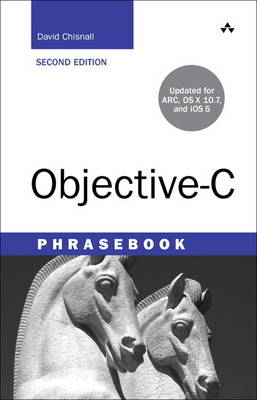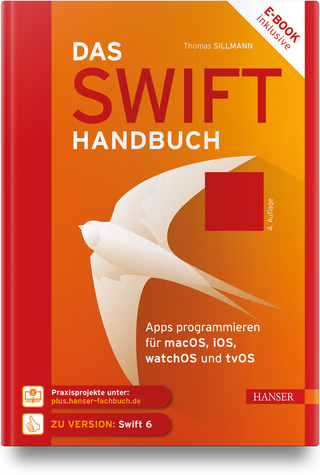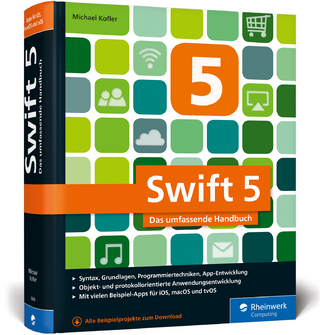
Objective-C Phrasebook
Addison-Wesley Educational Publishers Inc (Verlag)
978-0-321-81375-6 (ISBN)
- Titel ist leider vergriffen;
keine Neuauflage - Artikel merken
Objective-C Phrasebook, Second Edition
Updated for ARC, OS X 10.7, and iOS 5
Objective-C Phrasebook gives you the code phrases you need to quickly and effectively complete your programming projects with Objective-C.
The second edition of Objective-C Phrasebook has been updated for the new version of Objective-C supported by Apple’s LLVM compiler 3.0 on OS X 10.7 and iOS 5, and includes new coverage of ARC and other Objective-C features introduced with recent versions of Xcode.
Concise and Accessible
Easy to carry and easy to use–lets you ditch all those bulky books for one portable pocket guide
Flexible and Functional
Packed with more than 100 customizable code snippets–so you can readily create solid Objective-C code in just about any situation
Register your book at informit.com/register for convenient access to downloads, updates, and corrections as they become available.
David Chisnall is an active contributor to the GNUstep project, which provides an open source implementation of the Cocoa APIs, and cofounded the Étoilé project. He has created a new Objective-C runtime library, worked on Objective-C support in the clang compiler, and published papers on Objective-C.
Introduction xiv
1 The Objective-C Philosophy 1
Understanding the Object Model 2
A Tale of Two Type Systems 4
C Is Objective-C 5
The Language and the Library 7
The History of Objective-C 9
Cross-Platform Support 13
Compiling Objective-C Programs 15
2 An Objective-C Primer 19
Declaring Objective-C Types 20
Sending Messages 24
Understanding Selectors 28
Declaring Classes 31
Using Protocols 36
Adding Methods to a Class 38
Using Informal Protocols 42
Synthesizing Methods with
Declared Properties 43
Understanding self, _cmd, super 49
Understanding the isa Pointer 52
Initializing Classes 55
Reading Type Encodings 58
Using Blocks 60
3 Memory Management 63
Retaining and Releasing 64
Assigning to Instance Variables 66
Automatic Reference Counting 67
Returning Objects via Pointer Arguments 70
Avoiding Retain Cycles 73
Migrating to ARC 75
Autorelease Pools 78
Using Autoreleased Constructors 81
Autoreleasing Objects in Accessors 82
Supporting Automatic Garbage Collection 83
Interoperating with C 85
Understanding Object Destruction 88
Using Weak References 90
Allocating Scanned Memory 93
4 Common Objective-C Patterns 95
Supporting Two-Stage Creation 96
Copying Objects 98
Archiving Objects 100
Creating Designated Initalizers 104
Enforcing the Singleton Pattern 107
Delegation 109
Providing Façades 111
Creating Class Clusters 113
Using Run Loops 116
5 Numbers 119
Storing Numbers in Collections 121
Performing Decimal Arithmetic 125
Converting Between Strings and Numbers 128
Reading Numbers from Strings 130
6 Manipulating Strings 133
Creating Constant Strings 134
Comparing Strings 135
Processing a String One Character at a Time 139
Converting String Encodings 142
Trimming Strings 145
Splitting Strings 146
Copying Strings 148
Creating Strings from Templates 150
Matching Patterns in Strings 154
Storing Rich Text 156
7 Working with Collections 159
Using Arrays 161
Manipulating Indexes 163
Storing Unordered Groups of Objects 165
Creating a Dictionary 167
Iterating Over a Collection 169
Finding an Object in a Collection 173
Subclassing Collections 176
Storing Objects in C++ Collections 179
8 Dates and Times 183
Finding the Current Date 184
Converting Dates for Display 186
Calculating Elapsed Time 189
Parsing Dates from Strings 191
Receiving Timer Events 192
9 Working with Property Lists 195
Storing Collections in Property Lists 196
Reading Data from
Property Lists 199
Converting Property List Formats 202
Using JSON 204
Storing User Defaults 206
Storing Arbitrary Objects in User Defaults 210
10 Interacting with the Environment 213
Getting Environment Variables 214
Parsing Command-Line Arguments 216
Accessing the User’s Locale 218
Supporting Sudden Termination 219
11 Key-Value Coding 223
Accessing Values by Key 224
Ensuring KVC Compliance 225
Understanding Key Paths 229
Observing Keys 231
Ensuring KVO Compliance 233
12 Handling Errors 237
Runtime Differences for Exceptions 238
Throwing and Catching Exceptions 242
Using Exception Objects 244
Using the Unified Exception Model 246
Managing Memory with Exceptions 247
Passing Error Delegates 250
Returning Error Values 252
Using NSError 253
13 Accessing Directories and Files 255
Reading a File 256
Moving and Copying Files 258
Getting File Attributes 260
Manipulating Paths 262
Determining if a File or Directory Exists 264
Working with Bundles 266
Finding Files in System Locations 269
14 Threads 273
Creating Threads 274
Controlling Thread Priority 275
Synchronizing Threads 278
Storing Thread-Specific Data 280
Waiting for a Condition 283
15 Blocks and Grand Central 287
Binding Variables to Blocks 288
Managing Memory with Blocks 293
Performing Actions in the Background 296
Creating Custom Work Queues 298
16 Notifications 301
Requesting Notifications 302
Sending Notifications 304
Enqueuing Notifications 305
Sending Notifications Between Applications 307
17 Network Access 311
Wrapping C Sockets 312
Connecting to Servers 314
Sharing Objects Over a Network 317
Finding Network Peers 320
Loading Data from URLs 323
18 Debugging Objective-C 327
Inspecting Objects 328
Recognizing Memory Problems 330
Watching Exceptions 333
Asserting Expectations 335
Logging Debug Messages 337
19 The Objective-C Runtime 339
Sending Messages by Name 340
Finding Classes by Name 342
Testing If an Object Understands a Method 343
Forwarding Messages 346
Finding Classes 349
Inspecting Classes 351
Creating New Classes 353
Adding New Instance Variables 356
Index 359
| Verlagsort | New Jersey |
|---|---|
| Sprache | englisch |
| Maße | 116 x 180 mm |
| Gewicht | 304 g |
| Themenwelt | Informatik ► Programmiersprachen / -werkzeuge ► Mac / Cocoa Programmierung |
| ISBN-10 | 0-321-81375-8 / 0321813758 |
| ISBN-13 | 978-0-321-81375-6 / 9780321813756 |
| Zustand | Neuware |
| Informationen gemäß Produktsicherheitsverordnung (GPSR) | |
| Haben Sie eine Frage zum Produkt? |
aus dem Bereich

